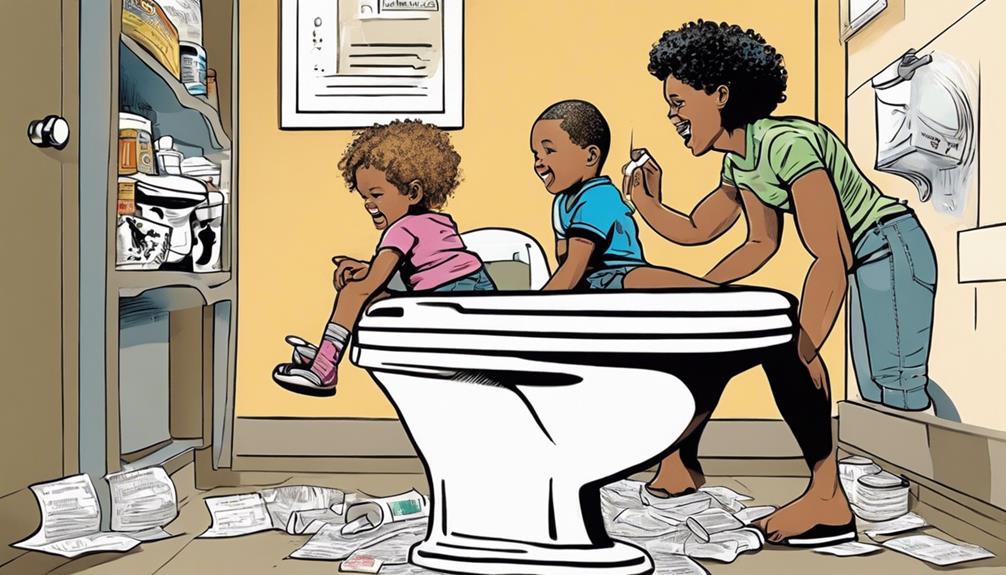Phubbing, prioritizing phones over quality time, negatively impacts relationships by reducing emotional connection and intimacy. It can lead to emotional infidelity and lower life satisfaction. To combat phubbing, establish boundaries for phone use during quality time and engage in tech-free activities. Consider couples therapy to address communication issues. Post-childbirth, heightened tech reliance can strain relationships, leading to emotional disconnection and decreased satisfaction. Creating tech-free zones, prioritizing quality time, and practicing mindfulness are essential. Cultivate healthy habits by setting aside tech-free zones, prioritizing genuine connection, and showing appreciation to build trust and intimacy. Examine how phubbing can endanger relationships.
Key Takeaways
- Phubbing diminishes emotional connection and relationship satisfaction.
- Setting boundaries on phone use during quality time is crucial.
- Engaging in tech-free activities fosters genuine bonding.
- Couples therapy can aid in resolving communication issues related to phubbing.
- Prioritizing face-to-face interactions over screen time prevents emotional distance.
Phubbing Behavior and Relationship Satisfaction
Phubbing behavior significantly impacts relationship satisfaction, leading to feelings of neglect and diminished emotional connection between partners. When one partner consistently prioritizes their phone over quality time with their significant other, it can create a sense of emotional distance and loneliness in the relationship.
This behavior can result in decreased levels of intimacy, empathy, and overall satisfaction within the partnership. Studies have shown that phubbing is associated with lower life satisfaction, increased anxiety, and depression among couples.
Impact on Emotional Infidelity

The detrimental impact of phubbing on relationships extends to fostering opportunities for emotional infidelity to develop due to unmet emotional needs.
Phubbing behavior, characterized by neglecting a partner for a phone, can lead to a lack of attention and validation within the relationship. This absence of emotional connection may drive individuals to seek emotional fulfillment outside the partnership, potentially resulting in emotional affairs.
Emotional cheating, similar in damage to physical infidelity, involves forming deep emotional bonds with others outside the relationship. Phubbing creates a gateway for emotional cheating, especially when couples fail to meet each other's emotional needs.
Addressing phubbing and rebuilding emotional connections within the relationship is pivotal in preventing the development of emotional infidelity.
Addressing Phubbing in Relationships

To combat the detrimental effects of phubbing on relationships, implementing strategies for open communication is essential. Addressing phubbing behavior starts with discussing boundaries around phone use during quality time.
Active listening, genuine interest, and engaging in tech-free activities promote quality bonding without distractions. Seeking couples therapy can aid in resolving communication issues related to phubbing.
Establishing tech-free zones or times, prioritizing face-to-face interactions, and practicing mindfulness are effective ways to combat phubbing and enhance relationship dynamics. By fostering open dialogue and setting clear expectations, partners can work together to reduce phubbing and strengthen their connection.
Communication is key in addressing phubbing and its impact on relationships, paving the way for healthier interactions and increased relationship satisfaction.
Strategies for Combating Phubbing

Let's combat phubbing by implementing practical strategies that promote open communication and quality bonding in relationships. Setting boundaries around phone use during quality time can help reduce phubbing.
Active listening, genuine interest, and tech-free zones during face-to-face interactions are effective in combating this behavior. Engaging in activities that foster bonding without distractions can strengthen relationships and reduce the urge to phub.
Seeking couples therapy or counseling can aid in addressing communication issues related to phubbing. Additionally, practicing mindfulness and prioritizing quality time over screen time can help improve relationship dynamics.
Phubbing Post-Childbirth Effects

Exhaustion post-childbirth often leads to increased reliance on technology for entertainment, impacting the quality of time spent with a partner. The fatigue and demands of caring for a newborn can result in mindlessly scrolling through devices, diverting attention away from the relationship.
This shift towards technology can foster emotional disconnection, potentially leading to feelings of neglect and dissatisfaction. The lack of emotional connection post-childbirth may create opportunities for emotional infidelity to develop, as partners seek fulfillment outside the relationship.
Consequently, phubbing in the aftermath of having a child can contribute to decreased relationship satisfaction and mental health issues. Addressing these challenges requires prioritizing quality time, setting boundaries around technology use, and actively working on maintaining emotional intimacy to counter the negative effects of phubbing.
Cultivating Healthy Relationship Habits

Establishing tech-free zones in our daily lives can greatly reduce phubbing behavior and foster stronger emotional connections in relationships. By creating designated spaces or times without digital distractions, partners can engage in meaningful face-to-face interactions, enhancing intimacy and communication.
Prioritizing quality time without screens allows for genuine connection and attentiveness, strengthening the emotional bond between individuals. Practicing mindfulness and being fully present during interactions can combat the negative impacts of phubbing, promoting a deeper understanding and connection with your partner.
Showing appreciation and affection through verbal and non-verbal cues also plays a crucial role in building trust and intimacy within the relationship. By cultivating these healthy relationship habits, couples can effectively address phubbing behavior and improve overall relationship satisfaction.
Enhancing Relationship Satisfaction

Prioritizing quality time and fostering emotional connections are key factors in enhancing relationship satisfaction.
To improve your relationship, consider the following strategies:
- Scheduled Date Nights: Setting aside regular time for just the two of you can strengthen your bond and create lasting memories.
- Open Communication: Discussing your feelings, needs, and concerns openly and honestly can deepen your emotional connection.
- Expressing Appreciation: Showing gratitude and affection towards your partner through words and actions can foster a sense of security and intimacy in your relationship.
Frequently Asked Questions
How Can Phubbing Impact Trust Within a Relationship?
Phubbing can erode trust within a relationship by creating feelings of neglect and disconnection. It diminishes face-to-face interactions, leading to decreased empathy and intimacy. Addressing phubbing through open communication and setting boundaries can rebuild trust.
What Are the Warning Signs of Emotional Cheating Linked to Phubbing?
We notice subtle shifts in emotional connection, like hidden shadows in sunlight, when phubbing paves the path to emotional cheating. Unmet needs blossom outside, nourished by neglect, leading hearts astray. Beware the signs.
Can Phubbing Behavior Lead to Long-Term Relationship Damage?
Yes, phubbing behavior can lead to long-term relationship damage. It causes neglect, decreased satisfaction, and emotional disconnection. Setting boundaries, open communication, and prioritizing quality time over screens are essential in preventing lasting harm from phubbing.
How Does Phubbing Affect Children's Relationships With Their Parents?
Phubbing affects children's relationships with parents by reducing quality time, leading to emotional disconnection and potential feelings of neglect. This behavior may hinder bonding, communication, and emotional development, impacting parent-child relationships negatively.
Are There Specific Techniques to Rebuild Trust After Phubbing Incidents?
To rebuild trust after phubbing incidents, we prioritize honest communication, set boundaries, and engage in quality time without distractions. Active listening, mutual understanding, and showing appreciation help restore trust and connection in our relationship.
Conclusion
To sum up, the impact of phubbing on relationships is more significant than we may realize. It can lead to emotional infidelity and strains post-childbirth.
By addressing phubbing and implementing strategies to combat this behavior, we can safeguard the intimacy and trust within our partnerships.
Let's not underestimate the power of our phones to disrupt our connections with loved ones – it's time to prioritize real conversations over digital distractions.










